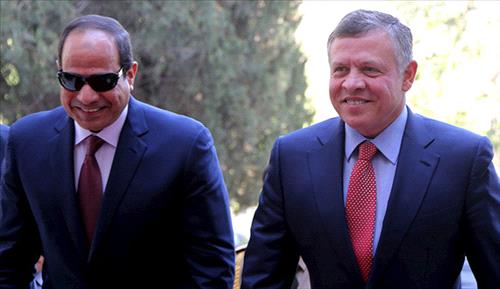Ammon News - AMMONNEWS - After a year of undeclared tension, Egyptian-Jordanian relations witnessed remarkable developments following the overthrow of the Muslim Brotherhood-affiliated President Mohammed Morsi in July 2013.
Jordan did not initially express its reservations after Morsi's election in July 2012. At the time, the Jordanian government welcomed the success of the electoral process in Egypt, without making a clear reference to Morsi. Two days after Morsi’s election, King Abdullah welcomed the move, but a muffled crisis surfaced because of the low flow of Egyptian gas to Jordan.
Less than a month after his election, Morsi met with Jordanian Foreign Minister Nasser Judeh, who expressed his hope to solve the problem of the gas line from Egypt to Jordan, since the decline in gas flow was costing Jordan $5 million a day.
Egypt has been exporting natural gas to Jordan since 2003. After the January 25 Revolution in Egypt, attacks by extremists on the pipeline impacted gas supplies. The Ansar Bayt al-Maqdis terrorist group, which operates in the Sinai Peninsula, repeatedly claimed responsibility for bombing the pipeline.
Egyptian-Jordanian relations have been strained ever since, as Jordan believes that Egypt's attitude toward securing the pipeline was lax. In response, Jordan deported about 1,900 Egyptian workers in December 2012. About 500,000 Egyptians, many of whom do not have work permits, work in the Jordanian service industry.
It was therefore not surprising that Jordan welcomed the July 3 events in Egypt, which marked Morsi's overthrow. The Hashemite Kingdom announced its support for the choice of the Egyptian people and its confidence in the armed forces. Egyptian-Jordanian relations entered a new stage of positive development. Most recently, the two countries signed 10 memorandums of cooperation during the May 27 visit of Egyptian Prime Minister Ibrahim Mehleb to Oman.
Jordanian-Egyptian rapprochement has provoked questions regarding the possible formation of an Arab front between the two states that shares a unified political vision to deal with regional issues.
Ambassador Badr Abdel Ati, spokesman for the Egyptian Foreign Ministry, told Al-Monitor that the two countries share common challenges and interests, so coordination is only natural. Abdel Ati denied that the two countries would form any kind of alliance, since “alliances do not fall within the scope of Egypt’s foreign policy.”
Abdel Ati said that Egypt and Jordan agree on reviving Arab cohesion and forming a joint Arab defense force to deal with the challenges facing the Middle East.
Jamal al-Shalabi, professor of political science at Hashemite University, believes that what unites the two countries is greater than these issues, and that they form the "concerned party."
Shalabi explained this term to Al-Monitor: “The two countries share a [common] concern, which is the Muslim Brotherhood, especially considering that the Brotherhood in Jordan intensified its opposition following the ascension to power of its Egyptian counterpart. Therefore, both countries cooperate to confront this danger, in the absence of a reform plan for the establishment of democracy in the two Arab countries.”
Shalabi defended his theory by stating that Jordan-Egypt relations, which deteriorated in the era of the Muslim Brotherhood, have since been mended and are now better than ever. King Abdullah was the first ruler to visit Egypt after the dismissal of Morsi. Egyptian President Abdel Fattah al-Sisi visited Amman in December 2014.
Shalabi does not believe that relations have reached the point of a united "front," but that at least there is now increased opportunities for cooperation to break out of their individual political and economic crises. In his recent visit, Mehleb focused on economic deals with Jordan, signing agreements concerning civil service and economic competition.
Abdul Nabi Abdul Muttalib, undersecretary of the Egyptian Ministry of Trade and Industry, said Egypt’s economic relations with Jordan have become stronger after June 30. “The most important outcome of Mehleb’s recent visit to Jordan is the improvement of the situation of the Egyptian workforce in Jordan after the deterioration of their situation under Morsi’s rule,” he said.
He said a protocol to prevent double taxation was signed between the two countries, meaning that Egyptian workers taxed in Jordan will be exempt from taxes in Egypt and vice versa.
Abdul Muttalib described Jordan as a transit line for Egyptian goods to Arab countries like Iraq and Syria. During Mehleb's visit, the prime minister agreed to facilitate the transit of goods.
Also signed was a a cooperation agreement between the state-run Egyptian Middle East News Agency (MENA) and its Jordanian counterpart, the Petra News Agency. MENA Managing Editor Ezzat Shaaban, who signed the agreement, said the two agencies will exchange news and photos.
“Each agency has an independent editorial policy, but they have one general direction based on Arab nationalism and support of the Arab world's interests," Shaaban said. "There is Egyptian-Jordanian coordination in all international forums, even with respect to news editing.”
Masoum Marzouk, former Egyptian deputy foreign minister, believes that Egypt and Jordan's political views do not converge — particularly regarding Syria — although both agree on certain broad outlines.
Egypt supports a political solution in Syria that would guarantee its territorial integrity, without insisting on the ousting of President Bashar al-Assad. The Jordanian stance is similar, yet Assad claims that Jordan supports extremist groups in Syria, while Jordan says that he is the initial cause of the crisis.
Nevertheless, Marzouk said that Egypt and Jordan have an almost consensual vision on most regional issues, thus ruling out the hypothesis that concern regarding the Muslim Brotherhood is the strongest link between the two countries. The strongest links are, however, the Palestinian cause and economic relations.
*Al-Monitor
